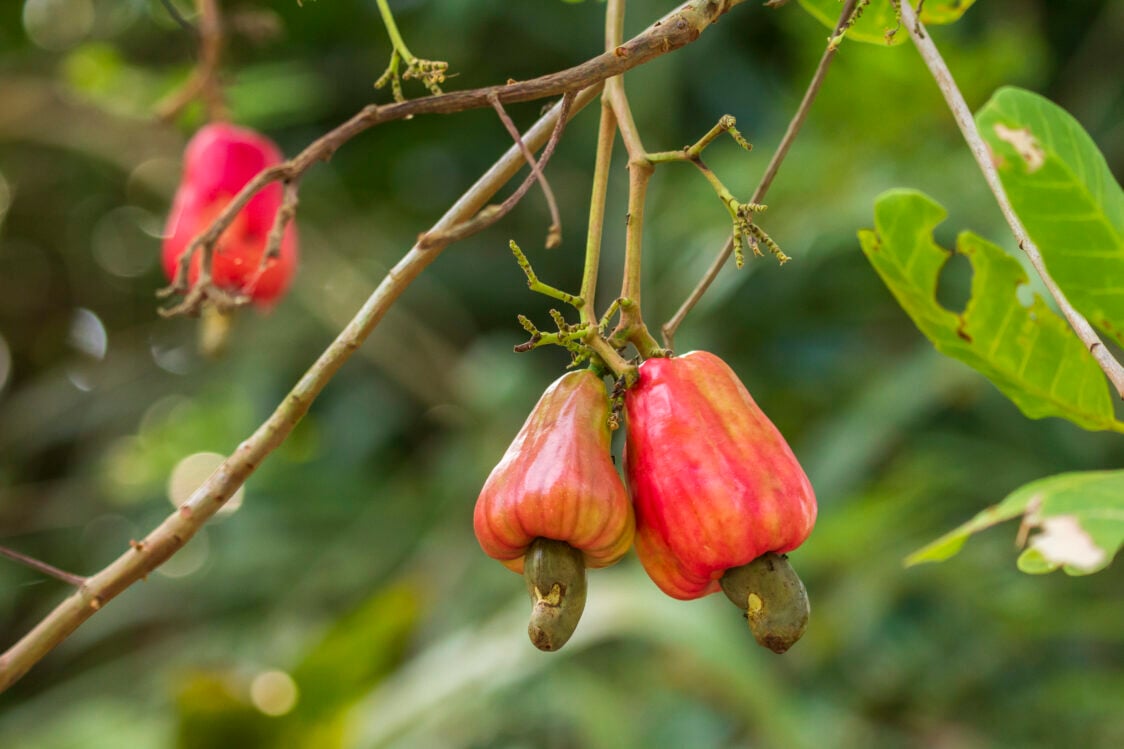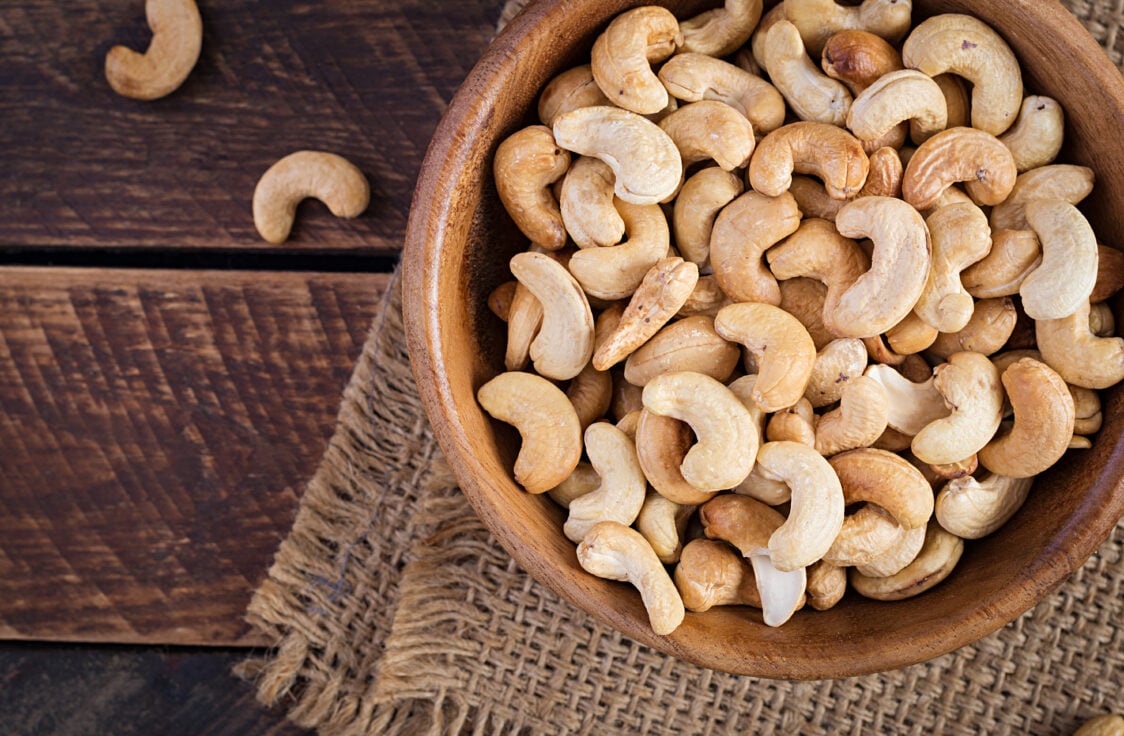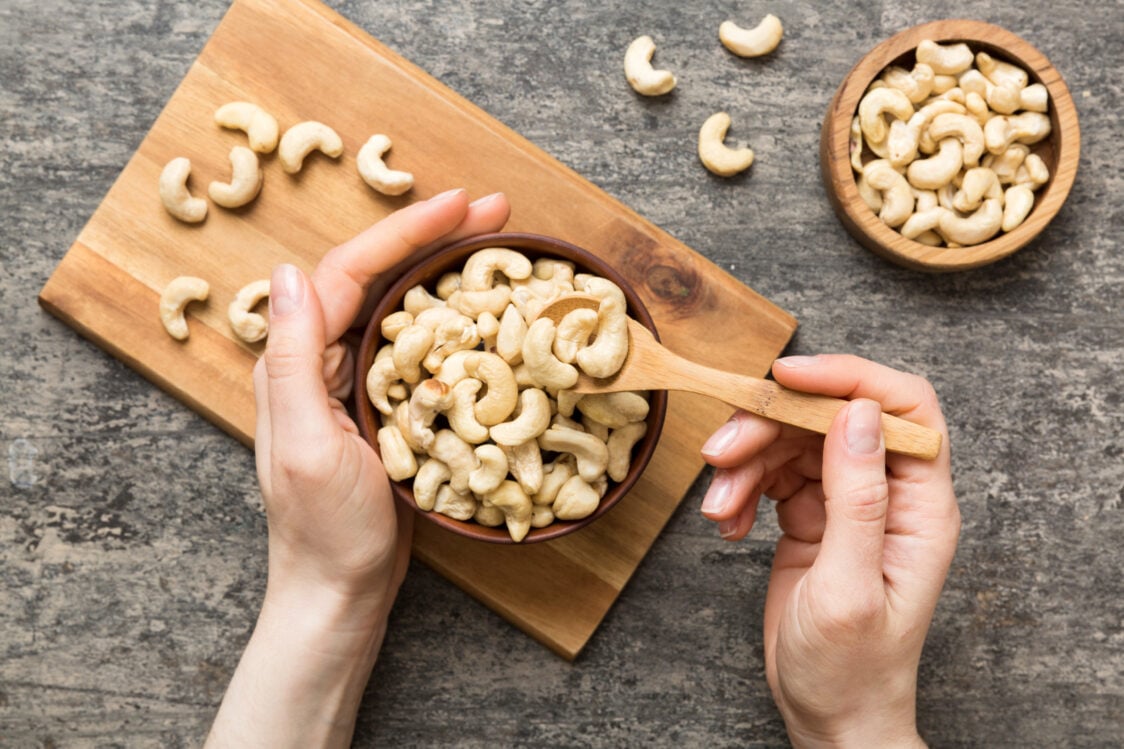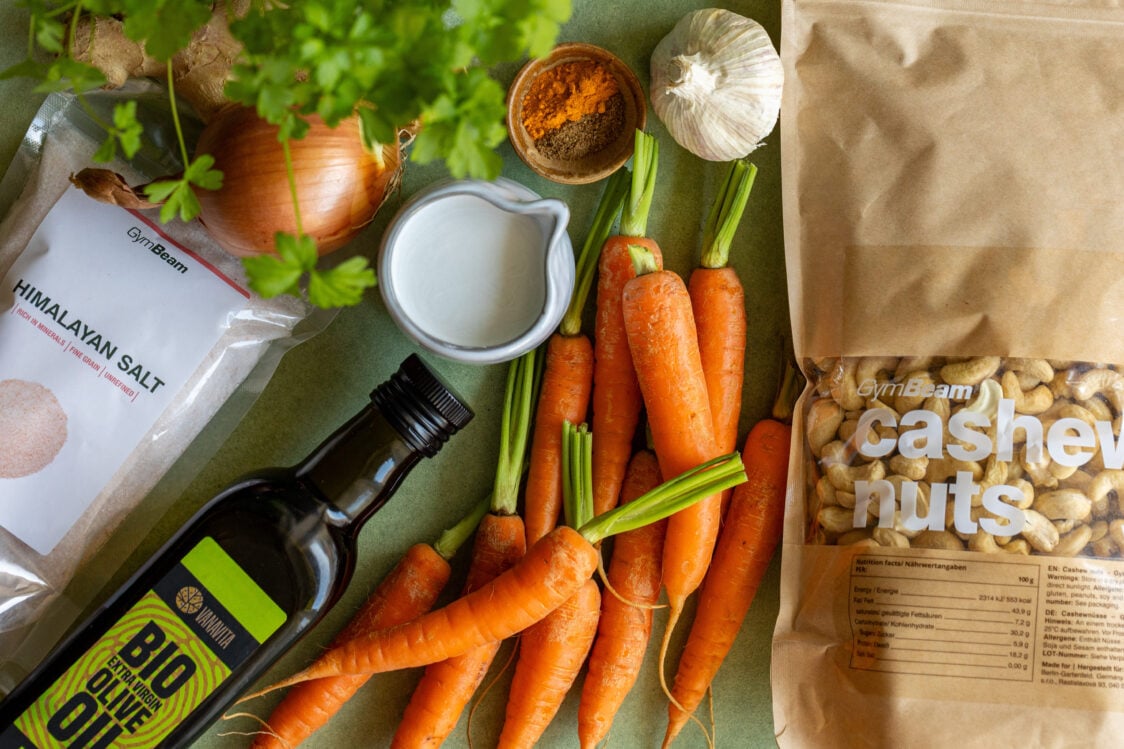Table of Contents
Cashews undoubtedly rank among the most popular types of nuts. In their delicate creamy texture and slightly sweet taste, they have no competition. And have you tried cashew butter? It tastes delicious! Cashews, besides their excellent taste, also impress with their nutritional composition and health benefits. So, when you add them to your diet, not only will your taste buds thank you, but so will your health.
In the article, you will learn about the impact of cashews on following areas:
What are cashews?
Did you know that cashews are quite unique among their nut relatives? They are the seeds of the cashew tree, specifically the Western Anacardium, and unlike other nuts, they don’t grow inside a fruit but on the outside of it. The tree is adorned with fruits known as cashew apples, which grow in clusters and feature kidney-shaped seeds at their ends. These seeds are harvested, processed, and eventually find their way into our kitchens as cashew nuts. Additionally, the fruits themselves are edible and used in the production of juices and jams. [6,7]
Cashew nuts originally hail from regions like Mexico, Peru, Brazil, and the Caribbean. However, their cultivation has gradually spread to other parts of the world, especially where a tropical or subtropical climate prevails. The tree on which these nuts grow is fascinating in its own right. It can reach heights of 10-13 meters and features a wide, majestic crown. In the Brazilian city of Natal, this tree has even become a tourist attraction. Visitors flock there to marvel at the massive naturally growing tree that covers an area of up to 0.75 hectares. [7]

How are cashews grown and processed?
Collecting cashew nuts is far from a simple task. It demands a significant amount of time and many helping hands, as the nuts are harvested manually and in multiple stages. Given that they ripen gradually, the harvesting process can span from 40 to 75 days. Ideally, both the fruits and the nuts should naturally fall from the tree. Picking them prematurely results in them being under-ripe. After they fall, the nuts separate from the fruits and are then sun-dried for several days. [7]
This is followed by moisture control, nut shelling, roasting, and several other crucial steps. The outcome of this intricate processing is raw cashew nuts and a liquid that originally lies between the nut and its shell. This liquid is toxic and unsuitable for consumption. Instead, it finds its use in the automotive industry or as an ingredient in paints. [7]
Cashew nuts absorb the toxic urushiol from this liquid, making it necessary for them to undergo heat processing before they reach store shelves. This heat treatment destroys the toxic substance, ensuring that the nuts can be safely consumed.

What health benefits do cashews offer?
1. They help protect the cardiovascular system
Current studies suggest that including cashew nuts in your diet is beneficial for the health of your heart and blood vessels. For instance, they have been shown to reduce LDL (bad) cholesterol levels and increase HDL (good) cholesterol levels in the blood.
Cashew nuts also seem to be beneficial for maintaining optimal blood pressure levels. This is supported by a study involving 62 participants. Those who consumed cashew nuts as 20% of their daily caloric intake showed an increase in baroreflex sensitivity. Baroreflex is an important mechanism involving both the cardiovascular and nervous systems, which the body utilizes to control blood pressure. [8,14]
Why do these effects manifest specifically in cashew nuts? It’s because they are rich in substances that have a positive impact on the cardiovascular system. Due to the combination of these beneficial substances, cashew nuts naturally offer a heart-friendly nutritional profile. [5]
- For instance, monounsaturated fatty acids, known as one of the healthy fats, have been shown to help maintain proper cholesterol levels when they replace saturated fats. [18]
- Arginine, on the other hand, functions in the body by assisting in the dilation of blood vessels, which in turn contributes to lowering blood pressure. [5,10]
- Phytosterols are plant substances structurally similar to cholesterol. Because of this, they can bind to similar receptors in the intestines as cholesterol, thereby preventing its absorption from the diet. [8]
- Potassium is a mineral substance that, through its mechanisms, helps maintain normal blood pressure levels. [18]
High blood pressure or elevated cholesterol can gradually lead to the development of atherosclerosis (hardening of the arteries). Once this health problem begins and is not addressed, it can gradually lead to conditions such as stroke, heart attack, or ischemic heart disease, where the heart muscle is not properly supplied with blood. Therefore, it is better to take care of your heart and blood vessels through nutrition, and cashew nuts can be one piece in this mosaic.
You might be interested in these products:
2. They have antioxidant properties
One universal way to take care of your overall health is to do everything you can to help the body fight free radicals. These radicals are formed by oxidative stress and can gradually contribute to the development of various chronic diseases, such as type 2 diabetes, lung diseases, neurological problems, and others. Cashew nuts, abundant in antioxidants, have been shown to offer these antioxidant effects in studies. [4,17]
Which substances in cashew nuts act as antioxidants?
- Vitamin E
- Flavonoids
- Phytosterols
- Phenolic compounds
- Beta-carotene
- Lutein
- Zeaxanthin
Cashew nuts are more than just a topping for your morning cereal; they can also be relied upon as allies in maintaining your overall health.

3. They help improve bone health
Cashew nuts have proven beneficial for the quality and strength of our bones. A diet rich in protein, certain vitamins, and minerals supports strong and healthy bones. Many of these nutrients can be found in cashew nuts themselves.
- Calcium is crucial for maintaining normal bone health as it’s the primary mineral in bone tissue. [16,18]
- Magnesium is an essential building block for bones and is also necessary, for instance, for energy production in bone cells. [1]
- Phosphorus is also a building component of bone tissue.
- Proteins are essential not only for muscle growth but also for the health and strength of bones.
- Vitamin K plays a role in bone metabolism and bone mineralization.
4. They help control blood sugar levels
When discussing blood sugar levels, or glycemia, one might immediately think of diabetics—people with diabetes. Their bodies struggle to maintain an optimal blood sugar range, often requiring management through a balanced diet, exercise, and in more advanced cases, medication and insulin.
In fact, fluctuating blood sugar levels can also occur in healthy individuals, often manifesting as energy dips, sudden fatigue, or even cravings for sweets. Therefore, even those without diabetes can benefit from maintaining stable blood sugar levels. Dietary elements like fibre, fats, and proteins help slow down sugar absorption into the bloodstream, and cashew nuts are a good source of these nutrients, contributing to this aspect of nutrition.
For instance, indulging in a classic homemade pudding can lead to a rapid rise in your blood sugar levels, followed by a quick drop that triggers cravings for sweets. However, if you complement the pudding with cashew nuts, this rapid drop may be avoided entirely, helping you stave off further snacking. Cashew nuts can be a great ally in managing appetite and maintaining energy levels throughout the day.
Do you regularly find yourself craving sweets? For more tips on how to deal with this, read the article 15 Steps to Kick Your Sugar Cravings for helpful advice.
Discover our bestsellers:
5. They aid in weight loss
A daily handful of nuts on your plate certainly won’t guarantee weight loss. However, cashews are rich in fibre, healthy fats, and proteins, which work together to provide a higher and longer-lasting feeling of fullness. As a result, cashew nuts can support weight loss efforts or help maintain an optimal body weight.[17]
For instance, when you sprinkle nuts into your breakfast yogurt with muesli and fruit, hunger should arrive later in comparison to having breakfast without them. This allows you to consume fewer calories throughout the day, making it easier to achieve a caloric deficit, which is the foundation of successful weight loss.
However, be mindful of the high caloric content of cashew nuts. With up to 580 kcal per 100g, it’s important to control the portion you consume daily.
For a comprehensive overview of what’s important for effective weight loss, check out the article Simple Basics of Weight Loss: You’ll Be Surprised What Really Matters.
6. They improve eye health
Cashew nuts are rich in a variety of nutrients essential for eye health and sharp vision. They provide a diverse combination of vitamins, minerals, proteins, healthy fats, and various biologically active compounds. Which ones are they?
- Zinc is the most abundant mineral in the retina and a component of visual pigment, contributing to our ability to see. [13]
- Vitamin E plays a crucial role as an antioxidant, protecting the eyes from free radicals.
- Lutein and zeaxanthin are carotenoids known for their antioxidant effects.
- Omega-3 fatty acids have been shown in studies to be beneficial for conditions like dry eyes. [2]
Taking care of your eyes is increasingly important in today’s digital age, where hours are spent looking at computers and mobile phones. Cashew nuts can be a beneficial addition to your diet to support eye health.
More health benefits of cashew nuts
- Cashew nuts may also aid digestion due to their fibre content, which promotes regular bowel movements.
- Studies have highlighted their positive impact on osteoarthritis, an inflammatory joint disease. [3]
- Additionally, their zinc content can benefit your hair and nails.
- The nutrients in cashew nuts, including folate and zinc, also support a healthy immune system. [18]

How much energy and nutrients do they contain?
Cashew nuts are a treasure trove of beneficial micronutrients and macronutrients. While their content can vary slightly due to factors like climatic conditions, storage, and processing methods, the nutrient profile remains largely consistent.
Average content of calories and macronutrients in cashew nuts
| NUTRITIONAL VALUES OF CASHEW NUTS | |
|---|---|
| Energy value | 581 kcal |
| Protein | 18 g |
| Fat | 44 g |
| of which saturated fatty acids | 8 |
| of which monounsaturated fatty acids | 24 g |
| of which polyunsaturated fatty acids | 7.8 |
| Carbohydrates | 26.7 g |
| of which which sugars | 6 |
| Fibre | 3.3 g |
What macronutrients do cashews contain?
- Cashew nuts are rich in healthy fats, primarily monounsaturated fatty acids (MUFA), with oleic acid being the predominant one. This acid is known for its positive effects on cholesterol levels. [18,19]
- Additionally, they contain polyunsaturated fatty acids (PUFA), with linoleic acid being the most abundant essential fatty acid.
- While cashew nuts also offer a significant amount of protein, they don’t provide an optimal spectrum of essential amino acids, which disqualifies them from being a complete source of protein.
- They’re also a source of fibre. Thanks to this, they’re beneficial for your gut microbiome and digestion.
What vitamins do cashews contain?
- Vitamin E acts as an effective antioxidant, helping the body combat antioxidative stress.
- Vitamin B3 (niacin) supports the functioning of the nervous system and mental health, while also reducing fatigue and exhaustion.
- Folate is particularly essential for women, playing a role in the growth of embryonic tissues during pregnancy and contributing to blood formation and immune system function.
- Vitamin K, which is important for normal blood clotting and maintaining healthy bones. [18]
What minerals do cashews contain?
- Calcium, which is essential for blood clotting, muscle function, and nerve transmission.
- Magnesium contributes to electrolyte balance, cell division, and nervous system function. It may also help alleviate muscle cramps and reduce cramps during menstruation and premenstrual syndrome (PMS), as indicated by some studies. [9]
- Phosphorus supports the function of cell membranes and helps maintain normal bone and tooth structure.
- Potassium, which is essential for maintaining normal blood pressure.
- Zinc, which plays a crucial role in nutrient metabolism and maintains normal fertility, reproduction, and testosterone levels in the blood. [18]
What bioactive compounds do cashews contain?
- Phytosterols help reduce the absorption of cholesterol from the diet.
- Lutein and zeaxanthin act as antioxidants, combating oxidative stress.
- Phenolic compounds are a group of biologically active substances known for their antioxidant, anti-inflammatory, and other beneficial effects.
- Beta-carotene is an antioxidant and also converts into vitamin A. [7]
In what forms are cashews available?
If you want to enjoy the natural flavour of nuts while reaping their benefits, natural cashew nuts are the right choice for you. For a bit of variety, you can also enjoy flavoured ones or have them even in the form of butter.
- Cashews coated in chocolate, yoghurt, or caramel are perfect for those with a sweet tooth. You can enjoy them as a sweet treat after lunch or add them to your porridge or yogurt with muesli.
- Conversely, roasted and salted cashews or those with chilli flavour will appeal to lovers of savoury treats. They make a great snack alternative to chips.
- Cashew butter is made by blending cashew nuts, so it has the same nutritional value. If you have a sweet craving, you can opt for a flavoured version.
- Cashew flour is useful when you’re looking for an alternative to classic white wheat flour. It’s gluten-free, making it great for a gluten-free diet.

Cashews and their safety
As we’ve already mentioned, raw cashew nuts contain a toxic substance called urushiol. This is primarily toxic to the skin and mucous membranes, causing contact dermatitis, a surface inflammatory reaction on the skin. However, heating cashew nuts removes urushiol. You don’t need to worry about roasting, cooking, or baking them at home. The manufacturer takes care of this during processing before the nuts reach the store. [12]
Are cashews allergens?
Cashew nuts are among allergens, just like other types of nuts. They are listed as allergen number 8. According to recent research, cashew allergies are on the rise. Therefore, if you’re prone to allergic reactions, it’s possible that this might apply to cashews as well. Always be cautious, and if an allergy manifests, it’s advisable to avoid this type of nut completely. [15]
Are cashews suitable during pregnancy and breastfeeding?
Pregnant women can safely enjoy cashew nuts. The old recommendation to avoid nuts during this period no longer holds. On the contrary, pregnant women can benefit from this nutrient-rich food. The same applies to breastfeeding mothers. However, during these periods, it’s essential to be particularly careful to ensure that the nuts are not mouldy or otherwise spoiled.

How much cashews can you eat daily?
Specific daily recommendations for cashew consumption are nowhere to be found. However, dietary guidelines suggest that we should ideally consume about 30 g of nuts daily, roughly equivalent to one handful. The choice of nut type is yours, but mixing it up with a variety is always a good idea!
This quantity should also fit within the recommended daily fat intake, which should make up 30% of the total daily energy intake. For a 2000 kcal diet, this is 600 kcal or 67 g of fat. 30 g of cashew nuts contains approximately 13 g of fat. This portion provides a significant amount of healthy fats to the body while leaving room to obtain fats from other sources (fish, meat, oils, dairy products, etc.).
If you’re interested in exploring other nutritious nuts to add to your diet, don’t miss the article Which Nuts Are the Most Nutritious and What Health Benefits Do They Have?
How to store cashews?
Proper storage of cashew nuts is essential to prevent them from molding or spoiling, especially given their higher carbohydrate content compared to other nuts. To protect them from mold and oxidation, store cashew nuts in a dark, dry place like a pantry. For even better preservation, store them in a sealed glass container in the refrigerator.
For more tips on how to store food properly to make it last longer, check out the article How to Properly Store Food to Make It Last Longer.
How can you use cashews?
Cashew nuts are versatile and can be used in various ways beyond morning porridge or yoghurt. Here are some ideas to incorporate them into your diet:
- If you really like your classic meals, add them to oatmeal, quark, or yoghurt along with muesli and fresh or freeze-dried fruit.
- Use them as an ingredient in granola, homemade muesli, or muesli bars.
- Incorporate them into cakes, bundt cakes, muffins, or banana bread.
- Make a crust for cakes or desserts.
- Use them as a base for sweet creams in raw, vegan, or no-bake desserts.
- Create sauces for pasta or meat dishes.
- Sprinkle them on pasta or vegetable salads for added crunch.
- Make cashew milk by blending the nuts with water and straining the mixture.
Cashew nuts can be used interchangeably with other popular nuts like almonds or peanuts. At the end of the day, incorporating a variety of nuts into your diet will bring you diverse health benefits.

What should you remember?
Perhaps cashew nuts have already won you over with their delicate texture and pleasant sweet taste. They are a tasty snack that is also rich in beneficial nutrients. Thanks to their content of antioxidants, vitamins, minerals, proteins, and other nutrients, they offer numerous health benefits. They contribute to maintaining good cardiovascular health, vision, and bone health, and can even support weight loss efforts. So don’t hesitate to try preparing a tasty and healthy recipe with cashew nuts or delicious cashew butter.
How did you find today’s article? Did you discover something new? If so, we’d be delighted if you shared it with your friends and family.
[1] CASTIGLIONI, S. et al. Magnesium and Osteoporosis: Current State of Knowledge and Future Research Directions. – https://www.mdpi.com/2072-6643/5/8/3022
[2] DOWNIE, L.E. et al. Omega‐3 and omega‐6 polyunsaturated fatty acids for dry eye disease. – https://www.ncbi.nlm.nih.gov/pmc/articles/PMC6917524/
[3] FUSCO, R. et al. The Role of Cashew (Anacardium occidentale L.) Nuts on an Experimental Model of Painful Degenerative Joint Disease. – https://www.ncbi.nlm.nih.gov/pmc/articles/PMC7346149/
[4] CHANDRASEKARA, N. - SHAHIDI, F. Antioxidative potential of cashew phenolics in food and biological model systems as affected by roasting. – https://linkinghub.elsevier.com/retrieve/pii/S0308814611007783
[5] JALALI, M. et al. The effects of cashew nut intake on lipid profile and blood pressure: A systematic review and meta-analysis of randomized controlled trials. – https://linkinghub.elsevier.com/retrieve/pii/S0965229919320539
[6] MANDHARE, T. Health Benefit of a Handful of Cashew Nuts (Anacardium Occidentale L.) to Prevent Different Disorders Like Diabetes, Heart Disorders, Cancer, Weight Gain, Gallstone, Migraine Headache. – https://www.academia.edu/74056746/Health_Benefit_of_a_Handful_of_Cashew_Nuts_Anacardium_Occidentale_L_to_Prevent_Different_Disorders_Like_Diabetes_Heart_Disorders_Cancer_Weight_Gain_Gallstone_Migraine_Headache
[7] MORTON, J.F. CASHEW NUTS AND CASHEW APPLES. In CABALLERO, B.Ed. – https://www.sciencedirect.com/science/article/pii/B012227055X001802
[8] MORVARIDZADEH, M. et al. Effect of Cashew Nut on Lipid Profile: A Systematic Review and Meta-Analysis. – https://www.karger.com/Article/FullText/506348
[9] PARAZZINI, F. et al. Magnesium in the gynecological practice: a literature review. – https://pubmed.ncbi.nlm.nih.gov/28392498/
[10] PARK, H.-Y. et al. Dietary Arginine and Citrulline Supplements for Cardiovascular Health and Athletic Performance: A Narrative Review. – https://www.ncbi.nlm.nih.gov/pmc/articles/PMC10005484/
[11] RODRÍGUEZ-OLLEROS RODRÍGUEZ, C. - DÍAZ CURIEL, M. Vitamin K and Bone Health: A Review on the Effects of Vitamin K Deficiency and Supplementation and the Effect of Non-Vitamin K Antagonist Oral Anticoagulants on Different Bone Parameters. – https://www.ncbi.nlm.nih.gov/pmc/articles/PMC6955144/
[12] ROSEN, T. - FORDICE, D.B. Cashew nut dermatitis. – https://pubmed.ncbi.nlm.nih.gov/8153790/
[13] SANGESTANI, G. et al. The Positive Effects of Zinc Supplements on the Improvement of Primary Dysmenorrhea and Premenstrual Symptoms: A Double-blind, Randomized, Controlled Trial. – https://jmrh.mums.ac.ir/article_4463.html
[14] SCHUTTE, A.E. et al. Modulation of baroreflex sensitivity by walnuts versus cashew nuts in subjects with metabolic syndrome. – https://pubmed.ncbi.nlm.nih.gov/16733237/
[15] VALK, J.P.M. VAN DER et al. Systematic review on cashew nut allergy. – https://pubmed.ncbi.nlm.nih.gov/24734868/
[16] VANNUCCI, L. et al. Calcium Intake in Bone Health: A Focus on Calcium-Rich Mineral Waters. – https://www.ncbi.nlm.nih.gov/pmc/articles/PMC6316542/
[17] Cashew Nuts - ScienceDirect. – https://www.sciencedirect.com/science/article/abs/pii/B9780123849472001239
[18] EU Register of nutrition and health claims made on foods (v.3.6). – https://ec.europa.eu/food/safety/labelling_nutrition/claims/register/public/?event=search
[19] FoodData Central. – https://fdc.nal.usda.gov/fdc-app.html#/food-details/173757/nutrients


Add a comment